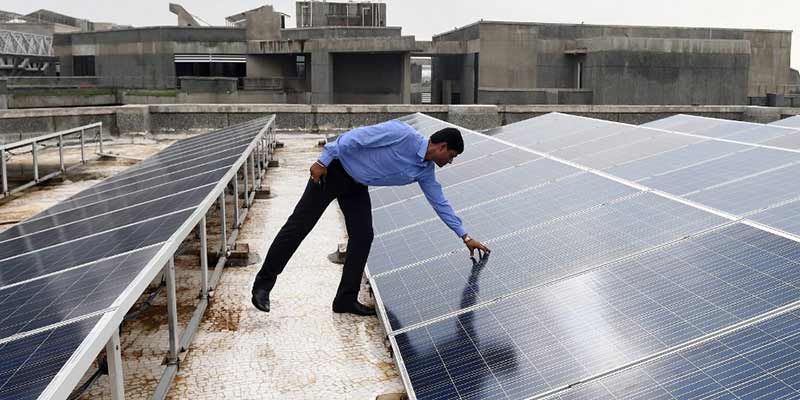- India
- Jul 16
Daily Briefing / July 16, 2019
Renewable energy capacity hits 80 GW mark
India’s renewable energy capacity has crossed the 80 GW mark. The government has set an ambitious target of having 175 GW of clean energy capacity by 2022, including 100 GW solar and 60 GW of wind energy. “A total of 80.46 GW of renewable energy capacity has been installed in the country as on June 30, which includes 29.55 GW from solar and 36.37 GW from wind power,” Power and New & Renewable Energy Minister R.K. Singh informed the Rajya Sabha. As per India’s submission to the UN Framework Convention on Climate Change on Intended Nationally Determined Contribution, a cumulative power capacity of 40 per cent from non-fossil fuel-based energy resources is to be installed by 2030. Accordingly, the government has set a target of installing renewable energy capacity of 175 GW by 2022.
Exports decline after a gap of eight months
India’s exports have entered the negative zone after a gap of eight months, recording a decline of 9.71 per cent to $25.01 billion in June. Imports also declined 9 per cent to $40.29 billion in June mainly due to falling prices of petroleum products, leaving a trade deficit of $15.28 billion. It was in September 2018 when exports last contracted - by 2.15 per cent. Exports were down on account of a fall in shipments of gems and jewellery, engineering goods, petroleum products, plastic, handicrafts, readymade garments of all textiles, chemicals, leather, and marine products, oil meals and oil seeds. In its Global Economic Prospects published in June, the World Bank had projected a weakening of global trade in 2019. Global trade is projected to grow at 2.6 per cent this year, a full percentage point below the previous forecast.
National Digital Health Blueprint released
Union Health Minister Harsh Vardhan has released the National Digital Health Blueprint (NDHB), which aims to create a national digital health ecosystem, and sought inputs from various stakeholders on its vision. The NDHB focuses on providing an efficient and affordable health coverage through a wide range of data and infrastructure services by leveraging open digital systems that will ensure security and privacy of personal information. He said the government is committed to ensuring high-quality health care for all. He appealed to all stakeholders to provide their feedback to make this “digital revolution” more inclusive and collaborative. “Digital health interventions are accelerating this transformation and have a huge potential for aiding universal health coverage,” he said.
Ebola case in DRC a ‘potential game-changer’
A confirmed Ebola case in the Democratic Republic of Congo is a “potential game-changer” in the epidemic that will be assessed by a WHO emergency response board. WHO chief Tedros Adhanom Ghebreyesus and the agency’s emergency chief, Mike Ryan, both sounded the alarm after an evangelical preacher fell ill in Goma. Goma, which has a population of around 1 million, is the capital of North Kivu province, the epicentre of what is now the second deadliest recorded Ebola outbreak on record. More than 1,600 people have died since the disease was first documented in the region last August 1. Tedros plans to convene the WHO’s emergency advisory board to assess whether the outbreak should be declared a “public health emergency of international concern”, a move that steps up the global response.
20 mn children not vaccinated in 2018
Almost 20 million children missed out on potentially life-saving vaccinations last year, the UN said, as surging measles cases highlighted “dangerous” gaps in efforts to shield kids from preventable illness. Last year, 19.4 million children were “not fully vaccinated”, the WHO and UNICEF said in an annual report - up from 18.7 million in 2017 and about 18.5 million the year before. This all pointed to a “dangerous stagnation of global vaccination rates, due to conflict, inequality and complacency”, the UN agencies said. The comparative birth rate was not provided, but they warned the global quest for widespread vaccination against life-threatening disease has stagnated. Some 350,000 measles cases were reported globally last year - more than double the 2017 number.
New species of duck-billed dinos identified
Scientists have identified a new species of duck-billed dinosaurs which roamed the Earth 80 million years ago. The study, published in the Journal of Systematic Palaeontology, describes the most complete skull of a duck-billed dinosaur from Big Bend National Park in the US as a new genus and species, named Aquilarhinus palimentus. This dinosaur has been named for its aquiline nose and wide lower jaw, shaped like two trowels laid side by side. In the 1980s, Tom Lehman from Texas Tech University discovered badly-weathered bones. Research in the 1990s revealed an arched nasal crest thought to be distinctive of the hadrosaurid Gryposaurus. However, it was not until recent analysis that the researchers came to realise that the specimen was more primitive than the Gryposaurus and the two major groups of duck-billed dinosaurs.

